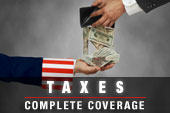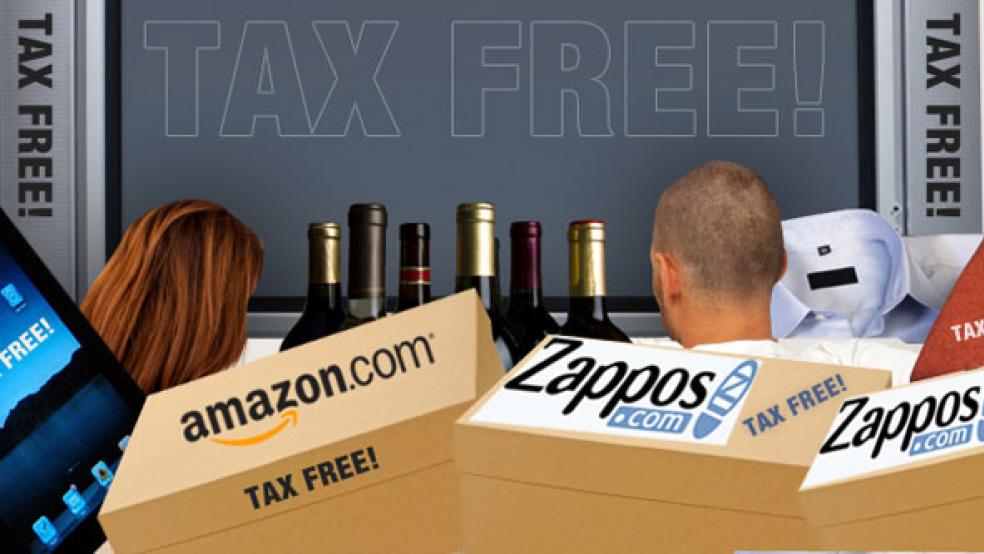It’s the easiest tax dodge available to average consumers. Visit the shoe store and try on a new pair. If you like the look and fit, go home and order them over the Internet.

The truly tech savvy don’t have to wait that long. They can step outside the store and order them from Zappos.com on their smart phone.
The consumer saves five to 10 percent – or whatever the sales tax is in his or her particular state. And the online retailer has an automatic price advantage over their bricks-and-mortar competition – the place where that consumer tried on the shoes.
Most sales taxes are “use” taxes, which means the consumer still owes the tax even when he or she buys online. Legislation that would put an end this rampant Internet sales tax scofflawing by forcing Internet retailers to collect local and state sales taxes has been introduced in both houses of Congress with bipartisan backing.
The bills have support from the National Governors Association, which now has a majority of its members from the Republican Party. It’s also backed by the National Federation of Retailers, whose members are rapidly losing sales to Internet retailers. It’s even won the endorsement of the National Conference of State Legislatures, which needs three-quarters of its members – a majority of which are now dominated by Republicans – to support a policy position before it will go out on a limb to engage in advocacy.
Yet the House version of the bill, sponsored by Rep. Steve Womack, R-Ark., and Jackie Speier, D-Cal., which would apply to every retailer with sales over $1 million a year – whether Amazon.com or the local flower shop, stands almost no chance of passing this year. Judging from a hearing before the House Judiciary Committee on Tuesday, it still doesn’t have enough support from either side of the aisle.
Legislators are clearly wary of passing anything that can be labeled a tax increase in an election year. “When you have to pass a law to tax somebody, that seems like a tax,” said Rep. Elton Gallegly, R-Cal. “We still have a lot of work to do,” agreed Rep. Zoe Lofgren, D-Cal., who submitted letters from “too numerous to count” home-based retailers in her district that she said would be harmed by the law.
There’s a lot riding on the bill, given the rapid transformation of the American retail landscape. The latest projections from Forrester Research shows online retailing continuing to grow at near double digit rates. It will leap from $202 billion in 2011 to $327 billion in 2016 or 9 percent of all retail sales. State and local governments estimate that they lost $23 billion in revenue from failure to collect sales taxes from online retailers.
“The rate of increase of E-commerce has been climbing steadily,” said David French, senior vice president for government relations at the National Federation of Retailers. “The overall trend toward Internet retailing is shrinking the footprint of stores and affecting more and more local retailers.”
States, whose revenues have begun to recover from the Great Recession, have been scrambling on their own to stop the revenue losses.
There are now two dozen states in a the Streamlined Sales and Use Tax Agreement (SSUTA), where states simplify their collection procedures in exchange for voluntary agreements by retailers to begin collecting taxes from their local residents when they order online. However, just $1 billion has been collected in the six years since the first states and retailers signed onto the agreement.
Another 16 states have cut special deals with Amazon.com, which has an estimated 20 percent of the online market. To get around a 1992 Supreme Court decision that ruled states couldn’t require catalog retailers to collect sales tax unless they had a physical presence in the state, they agreed to forego tax revenue from Amazon for a time in exchange for getting the company to set up a local distribution center. Texas, which had sued Amazon for $269 million in back taxes, began collecting current taxes under its special deal on July 1.
But those piecemeal approaches will never solve the problem, according to Gov. Bill Haslam, R-Tenn., who spoke on behalf of the NGA at the hearing. “I’m a Republican governor that does not believe in raising taxes,” he said. “This discussion should not be about raising taxes. It’s about collecting taxes that are already owed.”
Citing his personal background as son of the owner of Pilot Corp., a southern chain of convenience stores, and former director of e-commerce for Saks Fifth Avenue before entering politics, he said, “this is an issue of fairness. Comparable businesses that are selling the same thing are not treated the same way.” He claimed 16.6 percent of all sales are now on the Internet – a higher estimate than Forrester’s – and said it is now growing at four times the pace of the overall retail sector.
But the committee also heard pushback from a coalition of online retailers called NetChoice, whose roster of firms includes eBay, Expedia, Facebook, LivingSocial and Overstock. “These tax bills that are billed as fair are not really fair,” said Steve DelBianco, executive director of the coalition.
Citing the complexity of having to collect taxes for nearly 10,000 jurisdictions across the country if one includes local sales taxes – which proponents argued is easily solved today with off-the-shelf software that the legislature would require states to provide to retailers free of charge – DelBianco claimed the bill was really an effort by states “to export their tax burdens to out-of-state businesses. The juice isn’t just worth the squeeze,” he said.





